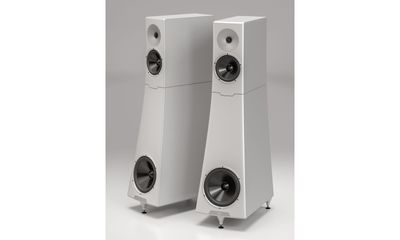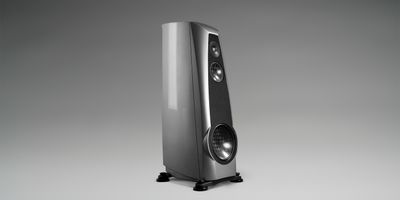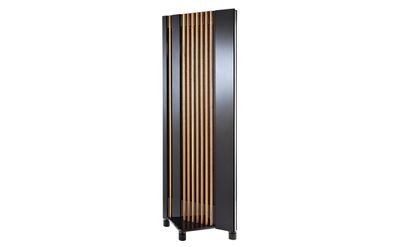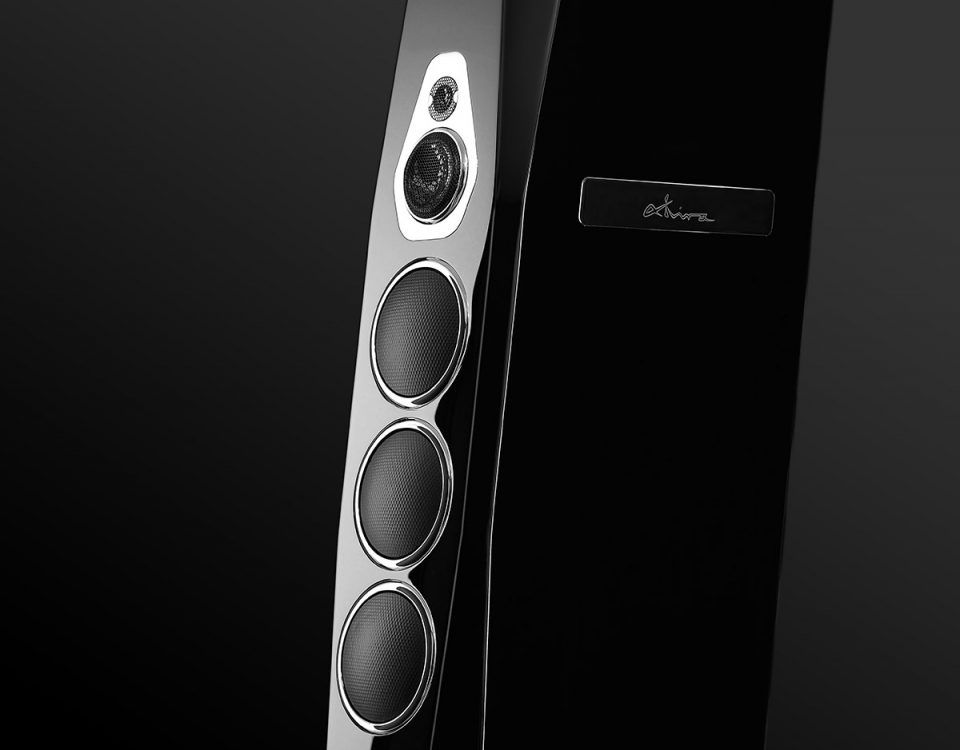What does the pursuit of “truth” in audio reproduction truly mean? Is it merely the act of pursuing flat frequency response, or is it an artistic endeavor to reproduce performers’ emotions without omission? To this fundamental question, there exists a brand that presents one philosophical answer through its products themselves. German TIDAL Audio—speakers bearing its name are not merely acoustic devices, but crystallizations of contemplation toward the truth of sound.
The TIDAL Audio Akira we examine in this article is one model that embodies this philosophy in its purest form. It undoubtedly possesses the rare power to elevate the act of music reproduction from function to art, and finally to the realm of philosophy.
Related Articles
YG Acoustics Hailey 2.2 Review: When the Machine Disappears and Music Manifests
Aerospace-grade aluminum enclosures machined from solid billets, BilletDome™ tweeters, ViseCoil™ inductors weaving ultimate transparency. A thorough examination of YG Acoustics Hailey 2.2's pursuit of 'acoustic purity' from both technical and musical perspectives.


YG Acoustics Hailey 2.2 Review: When the Machine Disappears and Music Manifests
Aerospace-grade aluminum enclosures machined from solid billets, BilletDome™ tweeters, ViseCoil™ inductors weaving ultimate transparency. A thorough examination of YG Acoustics Hailey 2.2's pursuit of 'acoustic purity' from both technical and musical perspectives.
Rockport Technologies Orion Review: The Apex of Non-Resonance Philosophy
An exhaustive examination of Rockport Technologies' semi-flagship floor-standing speaker 'Orion', featuring an absolutely non-resonant cabinet structure weighing over 163kg, analyzed through technical background and rich listening impressions.


Rockport Technologies Orion Review: The Apex of Non-Resonance Philosophy
An exhaustive examination of Rockport Technologies' semi-flagship floor-standing speaker 'Orion', featuring an absolutely non-resonant cabinet structure weighing over 163kg, analyzed through technical background and rich listening impressions.
Alsyvox Botticelli Review: An Acoustic Renaissance Through Planar Drive
From Spain, the ribbon speaker Alsyvox Botticelli designed by an Italian aerospace engineer. A thorough analysis and evaluation of the technology, acoustic performance, and market significance of this acclaimed device that overcomes the historical challenges of planar drive while achieving unparalleled transparency and dynamics.


Alsyvox Botticelli Review: An Acoustic Renaissance Through Planar Drive
From Spain, the ribbon speaker Alsyvox Botticelli designed by an Italian aerospace engineer. A thorough analysis and evaluation of the technology, acoustic performance, and market significance of this acclaimed device that overcomes the historical challenges of planar drive while achieving unparalleled transparency and dynamics.
TIDAL Audio Akira — Overview
First, we must clarify two “TIDALs” that often cause confusion. What we address in this article is TIDAL Audio GmbH, the ultra-high-end audio system manufacturer established in Germany in 1999 1, 2. Meanwhile, TIDAL Music AS, known for high-quality streaming, is a music delivery service originating from Norway, and both are completely separate organizations 3, 4. The fact that both entities coincidentally bear the same name—one symbolizing ultimate reproduction art with physical substance, the other representing music’s dematerialization and ubiquity—can be seen as an interesting mirror reflecting the modern audio scene.
-
Manufacturer / Model / Release Date / Price Range
-
Key Specifications
| Specification | Value | Source |
|---|---|---|
| Driver Configuration | 1.2-inch (30mm) Diamond Tweeter 5-inch (127mm) Diamond Mid-woofer 3 x 7.5-inch (190mm) Aluminum Honeycomb Woofers 5 x 7.5-inch (190mm) Aluminum Honeycomb Passive Radiators | 5, 6 |
| Crossover Frequencies | 250Hz, 2.2kHz | 5, 13 |
| Nominal Impedance | 4 Ω (minimum 3.5 Ω at 111Hz) | 5, 14 |
| Sensitivity | 87.5 dB/2.83V/m (Stereophile estimated value) | 14 |
| Recommended Amplifier Power | 30 W minimum | 6 |
| Dimensions (H x W x D) | 148 cm x 29 cm x 55 cm (including stand) | 5, 6 |
| Weight | 158 kg /each | 5, 6 |
1. Tidal of Criticism: Global Perspectives on Akira
Products positioned at the summit like Akira become subjects of criticism, existing within dialogue with experts worldwide. Here, we read the tidal flow of this dialogue, calmly analyzing the essence behind words of praise and even the bias that evaluators’ positions bring.
| Media | Quote (Translation + Original) | Rating | Bias Assessment | Source URL |
|---|---|---|---|---|
| Stereophile (John Atkinson) | “The Akiras are the best-looking, best-built, best-sounding speakers I have had in my listening room” | ★★★★★ | Low Bias: Long-term home review. Reports both subjective acclaim and slight anomalies in objective measurements, extremely reliable. | 15, 16 |
| The Absolute Sound (Jonathan Valin) | “The Akiras…sounded exceptionally beautiful, exciting, and high in resolution.” | ★★★★★ | Medium Bias: Mainly show reports. Environment isn’t ideal, but consistent high praise from experienced critic is significant. | 8, 17 |
| StereoTimes (Clement Perry) | “What I heard was perhaps the least colored sound and stunningly beautiful, pure sound…that I can recall ever having heard.” | ★★★★★ | Medium Bias: Dealer audition. Environment is controlled but potential influence from manufacturer/dealer relationships cannot be denied. | 18 |
| Reddit User “blixco” (RMAF Show) | “It was like having a concert hall in a hotel room; the walls disappeared, the sound was vast and detailed, very fast, very.. big.” | ★★★★★ | High Bias: Enthusiastic first impression at audio show. Valuable as pure experience record but not analytical evaluation. Strong confirmation bias likely at work. | 7 |
Summary and Analysis
Looking across worldwide reviews, evaluations are surprisingly consistent and positive. Keywords converge on “transparency,” “effortless dynamics,” “lack of coloration,” “speed,” and “craft-level manufacturing quality” 8, 15, 18, 19.
However, most important among these praises should be the review by Stereophile magazine’s John Atkinson 5, 13, 14, 20. What makes his evaluation stand out is that it’s based on both long-term home listening and rigorous measurement data. Show reports and forum enthusiastic posts have value as stories of Akira’s irresistible “first impression impact,” but cannot serve as foundations for objective evaluation.
What’s interesting is the slight but important discrepancy between this overwhelming subjective evaluation and the objective measurement data Atkinson presented. His measurements showed a small peak around 1.1kHz and less-than-textbook bass integration 14. This fact throws a stone at the myth of Akira’s “perfection.” Whether this slight measurement quirk is at a negligible level for listening, or conversely, somehow contributes to its exceptional clarity—this question is undoubtedly key to understanding the essence of the Akira speaker.
2. Form Born from Necessity: Technical Insights
TIDAL Audio’s design philosophy is encapsulated in the phrase “Purity of Purpose” 2. Every element comprising Akira is positioned not as mere choice, but as “necessity” to reach the ideal of ultimate transparency. Its form is the crystallization of functional beauty purged of ostentation.
Diamond Hearts: Custom Drivers Born from Collaboration with Accuton
Akira’s acoustic core undoubtedly consists of two diamond drivers. One is a 1.2-inch (30mm) diamond tweeter, and the other is a 5-inch (127mm) pure diamond mid-woofer—unique to this model and the flagship La Assoluta 5, 21. Diaphragms made from 1 carat and 13 carats of diamond respectively 6 are technical feats in themselves.
The important point to understand here is that these are not simply expensive off-the-shelf products. They are custom-designed products born from TIDAL and Accuton’s long-term close collaboration 6, 21. This means TIDAL defined the extremely difficult challenge of “a midrange unit maintaining perfect piston motion far beyond crossover frequencies,” and Accuton provided the technical answer to solve it. Considering the market prices of smaller Accuton diamond midranges (90mm diameter pair for ¥12.5 million JPY, 50mm diameter pair for ¥3.58 million JPY) provided in the materials, we can understand how astronomical the cost of this 127mm unit is, and that it’s not mere luxury but investment in fundamental research to push acoustic physics limits.
Foundation of Silence: TIRALIT™ Cabinet
Speaker sound isn’t just what drivers emit. How the cabinet “doesn’t sing”—how to lower the noise floor called resonance—determines fine information reproduction. Akira’s cabinet uses TIDAL’s proprietary composite material “TIRALIT™ Ultra” 6, 22. This is 42mm thick multi-layer structural material combining hard layers with damping characteristics of softer layers like MDF, developed to achieve both metal-like rigidity and wood-like resonance absorption—contradictory characteristics 6, 13, 22.
This material’s importance is paradoxically proven by the existence of “VIMBERG,” a more accessible brand launched by TIDAL founder Jörn Janczak 23. VIMBERG also uses Accuton drivers and high-quality parts, but cabinets are not TIRALIT. In other words, this proprietary material is the physical manifestation of the “uncompromising philosophy” that makes TIDAL what TIDAL is, the core element justifying price differences. Its purpose is to make the cabinet a resonance black hole, creating perfect silence background for sound to be born.
Invisible Conductor: Crossover and Terminals
Even with the stage of drivers and cabinet prepared, music cannot be born without a conductor to harmonize them. Akira’s crossover network “TIDAL UNOPULSE” weighs 20kg itself and is housed in a dedicated sealed chamber 21, 24. Inside, only the finest components with proven long-term stability are used, including Duelund pure copper foil capacitors and Mundorf silver-carbon resistors, forming approximately 12dB/octave slopes 13, 24. Even input terminals use pure silver to thoroughly eliminate signal path influence 21—evidence of obsessive design philosophy that permits no compromise down to the finest details.
Journey to Acoustic Truth: Comparison with Competitors
While the goal of creating ultimate speakers is the same, there isn’t just one path to reach it. Let’s compare with rivals in the same price range to clarify Akira’s position.
| Feature | TIDAL Akira | Marten Coltrane Quintet | Wilson Audio Chronosonic XVX |
|---|---|---|---|
| Design Philosophy | Material purity / Frequency domain accuracy | Time/phase coherence | Time domain coherence / Modular structure |
| Tweeter | 1.2-inch Accuton Diamond 5 | 1-inch Custom Diamond 25 | 1-inch Convergent Synergy Mk.V Silk dome |
| Midrange | 5-inch Accuton Diamond 5 | 3-inch Custom Diamond (High-Mid) 7-inch Custom Beryllium (Midrange) 25 | 4-inch & 7-inch Paper pulp composite |
| Woofer | 3 x 7.5-inch Accuton Aluminum Honeycomb 5 | 2 x 10-inch Aluminum Sandwich 25 | 10.5-inch & 12.5-inch Paper pulp |
| Cabinet | TIRALIT™ Ultra Composite 6, 22 | Carbon fiber laminate 25 | ”X-Material” & “S-Material” composites |
| Crossover | Complex low-tolerance components, ~2nd order slope 13 | 1st order slope 25 | Custom design, hand-wired point-to-point |
| Core Difference | World’s largest diamond midrange | Strict 1st order slope crossover | Physical adjustment modules for time alignment |
This table shows that each company adopts different technical approaches based on different philosophies. Akira’s choices become important context for sound quality evaluation discussed later.
3. Sound Particles, Listening to Their Existence: Listening Impressions
What acoustic experience does precise engineering crystallize into? Here, we reconstruct the sonic world Akira depicts based on listening impressions quoted from multiple reviews.
| Reviewer / Media | Quote (Translation + Original) | Source URL |
|---|---|---|
| John Atkinson / Stereophile | ”It was the Akiras’ ability to separate the threads within each recording that impressed me—they simply stepped out of the way of the music making.” | 15, 20 |
| Clement Perry / StereoTimes | ”Additionally the sound was relaxed, silky smooth, loaded with intimate details with every little musical nuance being revealed.” | 18 |
| YouTube User / Show Attendee | ”…one thing about the Akira is that you will hear details…that you rarely hear with that song on any other system” | 26 |
Integrated Sonic Portrait
Integrating these fragmentary impressions, Akira’s acoustic portrait emerges.
Transparency and Resolution (Classical/Acoustic) What first astonishes about Akira’s reproduction is its overwhelming transparency. As Atkinson points out, each voice part in complex choral pieces can be heard clearly separated without muddiness 27. This isn’t simply having rich detail. Sound information is perfectly “organized,” bringing the sensation that the recorded space itself appears present within a vast, stable soundstage. Because cabinet resonance is infinitely close to zero, sound’s appearance and disappearance—micro-dynamics and reverb’s final particles—are depicted with surprising realism. It’s precisely as if the speaker’s existence disappears, creating the illusion that nothing intervenes between listener and source.
Speed and Impact (Jazz/Rock) The benefits of diaphragms made from diamond—the hardest material on earth—appear most notably in transient response characteristics. As Atkinson felt Bill Bruford’s drumming in Yes performances was “like live” 20, the attack and decay speed is lightning-fast, feeling no smearing or delay. The bass possesses weight described as “thunderous” 15 while remaining extremely tight and controlled without bloating. This is likely the result of design where three woofers and five passive radiators work together to uniformly excite room bass modes 24.
Chameleon Effect (Mirror of System) However, the most important yet difficult characteristic for Akira owners may be its “characterless” nature. Atkinson’s report that sound changed dramatically each time he switched amplifiers from Lamm to Constellation to Audio Research tells this speaker’s essence 20. Akira doesn’t have its own “sound.” Rather, it’s a “mirror” that reflects the character of all upstream equipment as-is, mercilessly.
This is both Akira’s greatest glory and heaviest cross. Purchasing it doesn’t guarantee “good sound.” Perfect sound is achieved only by owners carefully and patiently constructing the entire system. Scattered negative evaluations 28 are probably due to this characteristic. Akira is not for casual audiophiles but the ultimate diagnostic tool for seekers who continue exploring system depths.
4. Scales of Value: Comprehensive Evaluation of Akira
Can the $215,000 price be justified? To answer this question, we decompose Akira’s value along specific evaluation axes and calmly determine the scales’ tilt.
| Evaluation Axis | Score (out of 5) | Commentary |
|---|---|---|
| Technical Performance | ★★★★★ | Reaches technology’s pinnacle with proprietary TIRALIT cabinet, world’s largest diamond midrange, etc. While measurements show slight quirks, overall engineering is unparalleled. |
| Musical Appeal | ★★★★★ | Provides experience approaching recorded source essence through ultimate transparency and resolution. However, this appeal extremely depends on upstream component quality. |
| Build Quality | ★★★★★ | Perfect finish and manufacturing precision worthy of being called “audio’s Bugatti.” Materials, fit, and finish all reach artistic levels 18, 29. |
| Price-to-Value | ★★★☆☆ | Absolute price remains stratospheric, difficult to justify for everyone. However, we cannot ignore core component costs when reconsidering value. The 127mm diamond midrange in Akira has market prices exceeding ¥12 million for even smaller 90mm units, clearly showing component costs alone occupy considerable product price portions. This means price reflects not mere brand premium but investment in materials and R&D to pursue physical limits. Therefore, in cost-no-object realms, there’s certain inevitability in pricing. |
| Future-Proofing / Serviceability | ★★★★☆ | Design uninfluenced by trends with robust construction. Manufacturer keeps records of all drivers and can manufacture perfect clones 20. Long-term support system is rock-solid. However, repairs would be extremely expensive. |
Bias Check and Value Reconstruction
Positive Aspects: Unprecedented resolution, speed, transparency. Manufacturing quality serving as industry benchmark. One achievement point in the art called audio.
Negative Aspects: Stratospheric pricing. Extreme sensitivity to upstream equipment forces great effort on owners. With inappropriate combinations, can sound “thin” 20. And while many listeners might not perceive it, the 1.1kHz peak confirmed in measurements 14 becomes a slight Achilles’ heel in claiming objective perfection.
Akira’s value cannot be measured on simple performance-versus-price linear graphs. It exists on an asymptotic curve where costs increase exponentially for slight performance improvements. Its price breakdown heavily depends on material costs like the world’s only diamond midrange and TIRALIT, plus R&D expenses to realize them 13, 21. The remainder would be premiums for brand philosophy, German craftsmanship 1, and rarity of 10 pairs annually 10. Akira simultaneously serves as a high-performance acoustic transducer and luxury goods sharing aspects with Patek Philippe watches or Bugatti automobiles (comparisons TIDAL itself favors 6).
5. High-End’s Current Position and Akira’s Raison d’être
What meaning does Akira’s existence hold within modern high-end audio currents?
It can be called one extreme of materialist design philosophy that “materials are king.” The belief that using physically ideal materials like diamond enables drivers to operate as perfect pistons, eradicating distortion and achieving transparency. TIDAL is the purest adherent of this approach 2, 22.
Creating an interesting opposition is Sweden’s Marten, mentioned in comparisons. Marten, particularly the Coltrane series, adheres to strict 1st order (-6dB/oct) crossovers 25. This manifests the belief that perfect phase characteristics in the time domain, rather than anything else, are key to natural, coherent sound. For this, they permit certain compromises in perfect frequency response flatness or driver material unity.
Here we see opposition between two major doctrines in modern high-end audio. Is sonic “truth” found in the frequency domain (flat lines on graphs) or time domain (perfect phase alignment)? TIDAL Akira is the most eloquent advocate of the former, Marten Coltrane of the latter. There’s no answer which is correct. However, understanding this philosophical opposition structure highlights Akira’s raison d’être—its role as benchmark showing “how far can materialist approaches reach when pursued cost-no-object?“
6. Conclusion: For Whom Does This Sound Ring?
TIDAL Audio Akira is a speaker that is technically excellent, aesthetically perfect, yet mercilessly reflects systems while possessing astronomical pricing. It doesn’t “make” music. It erases mechanical interventions accompanying reproduction, allowing music to simply “exist” as itself.
This achievement comes with costs. Not just monetary ones. The cost of demands placed on owners and their entire systems. In its perfection exposing all other imperfections, Akira could be called a flawed masterpiece.
Recommended Users
- Purists/Audio Archaeologists: Listeners whose supreme purpose is hearing recording truth without any coloration. Seekers who own equally transparent, cost-no-object systems and can enjoy the challenge of meticulous system matching.
- Craft Enthusiasts: Aesthetic connoisseurs who view speakers as industrial artworks, highly valuing background philosophy and craftsmanship equally with sound quality.
Not Recommended Users
- Romanticists: Listeners seeking some “character” from speakers—warmer, more forgiving, or intoxicating qualities.
- Realists: All people considering price-performance ratio important indicators. Here, the law of diminishing returns appears in its most cruel form.
Future Prospects and Modification Possibilities This design is completely closed system—modification is impossible and not recommended. Its classic aesthetics and non-digital nature guarantee it as long-term investment unaffected by format or software changes.
Overall Rating: ★★★★★
This perfect score doesn’t mean Akira is the “best speaker” for everyone. This evaluates that within the extremely specific, pure design philosophy framework of pursuing sonic transparency cost-no-object, Akira perfectly achieves its purpose. It is one brilliant waymarker in the journey exploring audio reproduction’s limits.
References / Source Links
1. TIDAL Audio Official Website
4. The History Of TIDAL | Soundiiz
5. Tidal Audio Akira loudspeaker Specifications | Stereophile
6. TIDAL Audio Akira Product Page
7. Reddit: My favorite room @ RMAF. Tidal Akira speakers.
8. TIDAL system voted as “Best Of Show” from The Absolute Sound
9. Audiogon Listing: TIDAL Audio Akira
10. Lotus Hi-Fi: TIDAL Akira Product Page
13. Tidal Audio Akira loudspeaker Review | Stereophile
14. Tidal Audio Akira loudspeaker Measurements | Stereophile
15. Tidal Audio Akira loudspeaker Review (Page 2) | Stereophile
16. TIDAL Audio Show Report (TIDAL Contriva)
18. The Voice That Is… (A Visit to a TIDAL Owner) | StereoTimes
19. Audiogon Listing: TIDAL Audio Akira (2nd listing)
20. TIDAL Audio Akira Loudspeaker ($215,000) Review | Audiophile Pure
21. Airta Audio: TIDAL Akira Product Page
22. TIDAL Audio Technology: Cabinets
24. Audio Deluxe: TIDAL Akira Product Page
25. Marten Coltrane Quintet Product Page
26. YouTube: Audio Maestro - TIDAL AKIRA / B&W 800D3 Sound Comparison
27. StereoNET Forum: Tidal audio speakers?



